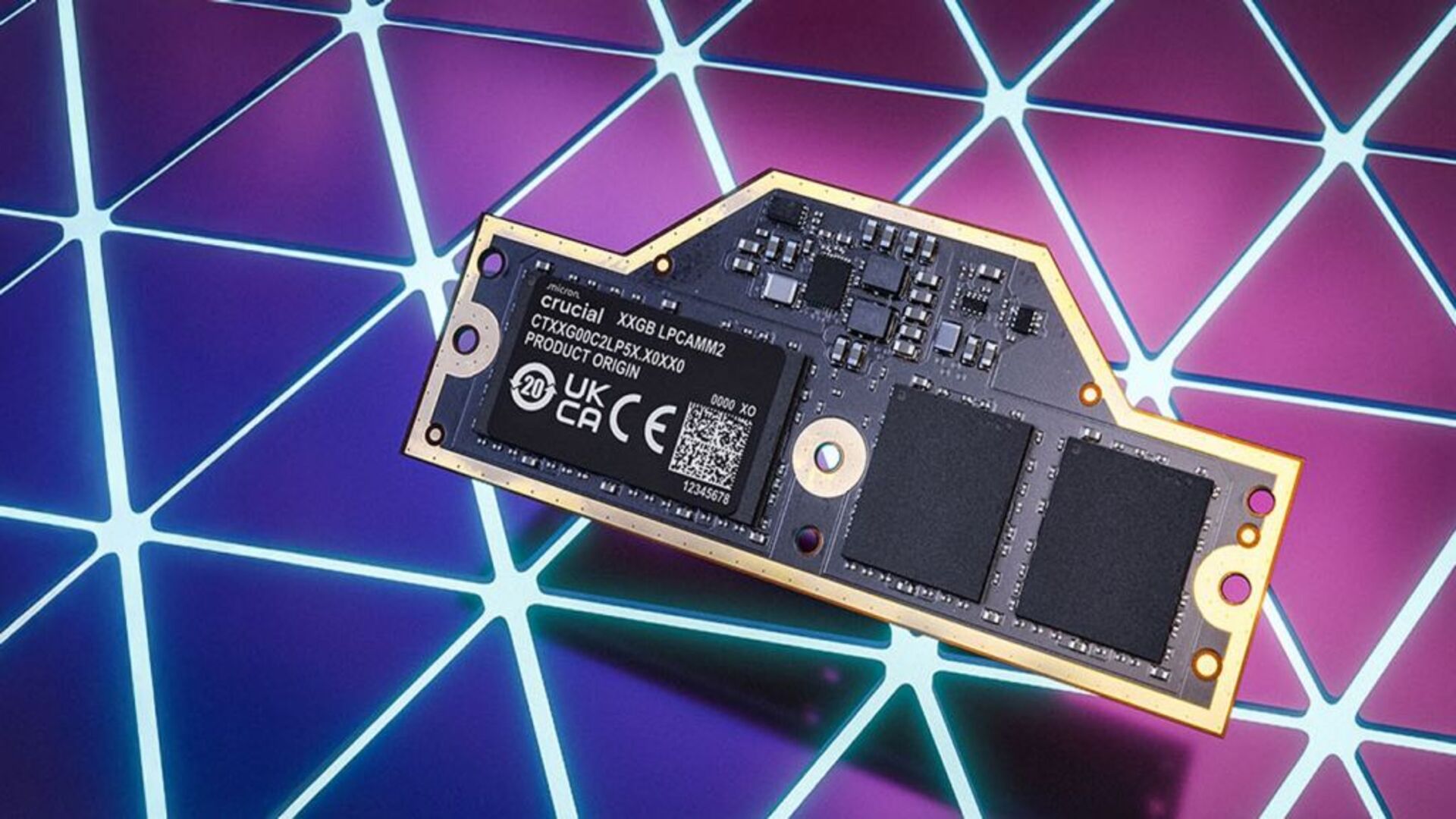Crucial reveals fastest laptop memory ever - LPCAMM2 RAM reaches a staggering 8533 MT/s, but at just under $500 for 64GB, it won't be for everyone
The smaller size promises better airflow and efficiency

Sign up for breaking news, reviews, opinion, top tech deals, and more.
You are now subscribed
Your newsletter sign-up was successful
- Crucial’s LPCAMM2 makes laptops faster, slimmer, and far more efficient
- The new format cuts memory module size by nearly sixty percent
- Transfer rates reach 8,533 MT/s, surpassing current DDR5 SODIMMs
Crucial has introduced its latest LPCAMM2 modules, a new memory form factor designed for laptops that emphasizes speed, efficiency, and space savings.
The company claims this memory technology reaches transfer rates of up to 8,533 MT/s, making it much faster than conventional DDR5 SODIMMs.
At roughly $451.99 for the 64GB version, Crucial presents the new result as a solution for future AI-enabled machines, but the high cost raises questions about its accessibility to the average user.
Design and efficiency considerations
LPCAMM2 differs from the SODIMM format, which has long defined upgradeable laptop memory.
By shrinking physical volume by around 60%, Crucial claims gains in airflow, battery efficiency, and layout flexibility for thinner machines.
The use of LPDDR5X reduces operating voltage to 1.05V, and official figures suggest up to 7x better power efficiency compared to earlier implementations.
These details may matter in premium notebooks where power consumption remains as important as raw speed.
Sign up to the TechRadar Pro newsletter to get all the top news, opinion, features and guidance your business needs to succeed!
Crucial describes the module as up to 1.5x faster than standard DDR5 SODIMMs, with real-world benchmarks citing improvements of around seventy percent in content creation and office workloads.
The peak transfer rate of 8,533 MT/s positions LPCAMM2 as the fastest laptop memory currently available.
It rivals what is found in desktops equipped with the fastest SSD for data handling.
However, adoption will depend on laptop vendors, as only select next-generation systems are expected to ship with compatible slots.
The close to $500 64GB price tag means this RAM enters the market as a premium component.
For users choosing the best laptop or even those interested in the fastest laptops, the cost may be justifiable if workloads rely heavily on multitasking, AI modeling, or complex media projects.
Yet for mainstream buyers, the lack of widespread support combined with the expense makes it less practical than higher-capacity SODIMMs at lower speeds.
The upgradeable nature of LPCAMM2 contrasts with the prevailing industry trend toward permanently soldered memory.
Crucial positions this as a sustainability feature, claiming reduced e-waste as laptops can be upgraded rather than discarded.
“Our customers are looking for upgradeable memory solutions that can keep pace with the demands of AI workloads and mobile multitasking,” said Jonathan Weech, senior director of product marketing for Micron’s Commercial Products Group.
“Crucial LPCAMM2 is designed to meet those needs with speed, energy efficiency, and the flexibility to upgrade, all in a compact form factor.”
Still, whether this form factor will gain long-term traction remains uncertain, since standardization depends on JEDEC compliance and broad manufacturer support.
Follow TechRadar on Google News and add us as a preferred source to get our expert news, reviews, and opinion in your feeds. Make sure to click the Follow button!
And of course you can also follow TechRadar on TikTok for news, reviews, unboxings in video form, and get regular updates from us on WhatsApp too.
You might also like
- Check out the best mini PCs for all budgets
- Take a look at the best cloud storage for photos
- Many businesses paying a ransomware demand don't get their data back

Efosa has been writing about technology for over 7 years, initially driven by curiosity but now fueled by a strong passion for the field. He holds both a Master's and a PhD in sciences, which provided him with a solid foundation in analytical thinking.
You must confirm your public display name before commenting
Please logout and then login again, you will then be prompted to enter your display name.